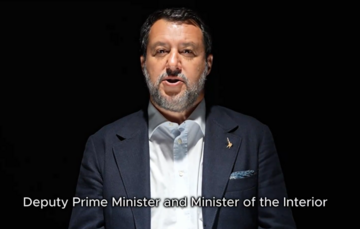
Screenshot taken from the video uploaded on social media platform X by Italy's deputy Prime Minister Matteo Salvini, on 14 September 2023, and subsequently aired by Italian public broadcaster RAI.
On 14 September, Rainews24, the news channel of Italy’s public broadcaster RAI, aired an almost four-minute monologue by deputy PM Matteo Salvini of the Lega Party. In the video he defends his actions, as former Minister of Interior, ahead of a court case where he is accused of kidnapping and neglect of duty for his decision to stop the docking of the Open Arms rescue vessel in 2019.
The editorial board of Rainews24 condemned the video broadcast, lamenting yet another case of leading members of the government using the channel as a “megaphone” for their statements. In a separate recent incident which sparked outcry, Gennaro Sangiuliano, Italy’s former Minister of Culture, used a prime-time news RAI segment to publicly handle personal matters, feeding into this concern.
The journalists warned that Salvini’s video, taken directly from his social media, was broadcast unchallenged and without analysis or counterpoints, and as such fell short of the basic principles of journalism. Lega MPs on the RAI Oversight Parliamentary Committee defended the broadcast, claiming it was a relevant news item, and accused the dissenting journalists of political bias.
This latest incident highlights long-documented concerns over political influence on RAI, just as the Parliament starts to debate the appointment of RAI’s new Board of Directors. The Board is composed of seven members, of which four are nominated by the two houses of Parliament, two by the Ministry of Economy, including the CEO, and one is elected by RAI employees. The parliamentary nominations and the President of the Board have to be approved by the Rai Oversight Committee, which requires a two-thirds majority and therefore the support of other political groupings outside those of the current government coalition.
There have been calls to reform the appointment process to reduce the level of political influence over the RAI board, in line with the recent European Media Freedom Act, and opposition parties are calling for the reform to take place before the new board is appointed. The outcome of this debate and the selection process will be a crucial test of whether the public broadcaster will remain free from political capture.
MFRR urges the RAI Oversight Parliamentary Committee to ensure that all those appointed are free of political partisanship, they are committed to upholding the principles of journalistic integrity, and to the safeguarding of RAI’s editorial independence.
Signed:
OBC Transeuropa (OBCT)
International Press Institute (IPI)
The European Centre for Press and Media Freedom (ECPMF)
The European Federation of Journalists (EFJ)
Free Press Unlimited (FPU)
Tags: media pluralism Freedom of expression Media ownership Media freedom Italy
This content is part of the Media Freedom Rapid Response (MFRR), a Europe-wide mechanism which tracks, monitors and responds to violations of press and media freedom in EU Member States and Candidate Countries. The project is co-funded by the European Commission.


